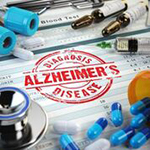
Today, there's no cure for Alzheimer's Disease, but there's hope that if people can be diagnosed years, maybe even decades before symptoms appear, we can stop or dramatically slow it down. A new test developed in Japan and Australia could bring us closer to that goal.
It's a blood test that was able to predict more than ninety percent of Alzheimer's cases among a group of three-hundred-seventy-three patients. Today people are diagnosed through a series of physical and mental tests, but only once symptoms have appeared.
The cause of Alzheimer's is unknown but its hallmarks are two abnormalities. One is the buildup of plaques which is a protein called beta-amyloid that accumulates around brain cells and blocks their communication. The other is the excess of tangles which result from a tau protein fiber. Both may be building up long before symptoms appear.
The new blood test works by binding to and concentrating portions of beta amyloid protein in the blood. Then it identifies and measures the amount of the protein using a highly sensitive and sophisticated lab technique called, I'll try to say this without mangling it: matrix-assisted laser desorption ionization'time of flight mass spectroscopy.
This study needs to be confirmed but if it works, imagine making it a part of your yearly physical. Patients could begin treatment right away which experts speculate can be much more effective than the advanced stage they're treated at now due to the late diagnosis.
Since Alzheimer's disease is the most common form of dementia and its risk doubles every five years after age sixty-five, that's a lot of baby boomers at risk and in need of a better diagnostic like this one.
More Information
Diagnosing Dementia
To diagnose dementia, doctors first assess whether a person has an underlying treatable condition such as abnormal thyroid function, normal pressure hydrocephalus, or a vitamin deficiency that may relate to cognitive difficulties. Early detection of symptoms is important, as some causes can be treated. In many cases, the specific type of dementia a person has may not be confirmed until after the person has died and the brain is examined...
New Blood Test For Alzheimer's Is So Precise It Could Predict It 30 Years Ahead
cientists have developed a new blood test where a tiny drop of blood could be enough to predict the onset of Alzheimer's ' and that would mean better care and preventative measures could be taken much earlier...
Alzheimer's and Dementia Testing for Earlier Diagnosis
What if we could diagnose Alzheimer's before symptoms started? The hope is, future treatments could then target the disease in its earliest stages, before irreversible brain damage or mental decline has occurred. Research on new strategies for earlier diagnosis is among the most active areas in Alzheimer's science, and funding from the Alzheimer's Association has spurred significant advances and steady progress...